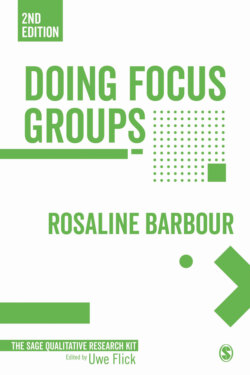Читать книгу Doing Focus Groups - Rosaline Barbour - Страница 8
На сайте Литреса книга снята с продажи.
About this book and its second edition
ОглавлениеUwe Flick
The use of focus groups has become a major approach in doing qualitative research in different areas, from market research to health research. In these areas we find more pragmatic and more systematic forms of using this method for data collection. Often focus groups are used as a stand-alone method, but in many cases they are integrated in a multiple methods design with other qualitative methods and sometimes with quantitative methods. They are also seen as a strong alternative to using single interviews as a data basis for qualitative analysis. The advantage here is that they not only allow analysis of statements and reports about experiences and events, but also analysis of the interactional context in which these statements and reports are produced. This method comes with specific practical and methodological demands of documenting and analyzing the data.
This book, Doing Focus Groups, examines the most important problems in using this method. Practical issues of sampling, of documentation and moderating in focus groups are addressed as well as more general reflections about ethics and about the adequate use or the misuse of focus groups as a method. Special problems of making sense of focus group data and of assessing their quality and that of their analysis are discussed as well. After reading this book, you should not only know more about how to do a focus group but also why and when to use this method.
Thus, in the context of The SAGE Qualitative Research Kit, this book complements the one on Doing Interviews by Brinkmann and Kvale (2018) and the one on Doing Ethnography by Coffey (2018) by outlining the third of the major ways of collecting data in qualitative research. Focus groups often become part of studies using triangulation and mixed methods (Flick, 2018a). This book also mentions special ways of analyzing the data produced in focus groups. But it is complemented by the books on Analysing Qualitative Data by Gibbs (2018) and on grounded theory by Flick (2018b), as well as by the one on studying conversation and discourse analysis by Rapley (2018). The same is the case for the issues of designing qualitative research (Flick, 2018c) and managing the quality of qualitative research (Flick, 2018d). This book addresses the specific problems in these respects linked to focus group research, whereas the others provide a more general framework in addressing the problems more widely for qualitative research. So you will find additional suggestions here; for example, about how to sample in focus group research and what that means for comparison, findings and generalization and what the ethical implications in this context are. For its second edition, Doing Focus Groups has been updated throughout and extended, so that it also is linked to the new versions and new books in the new edition of The SAGE Qualitative Research Kit.
